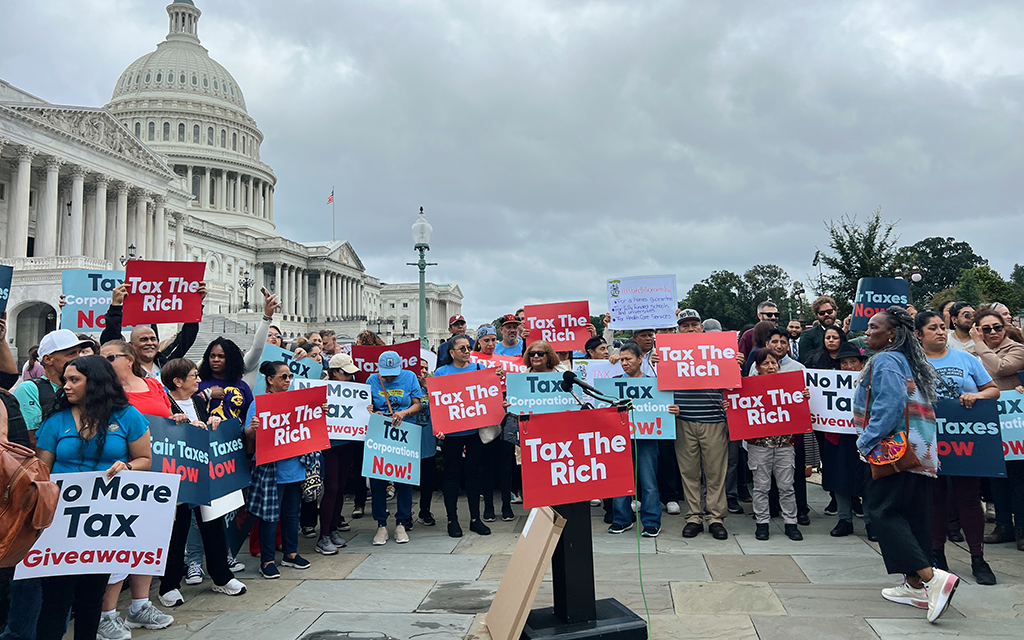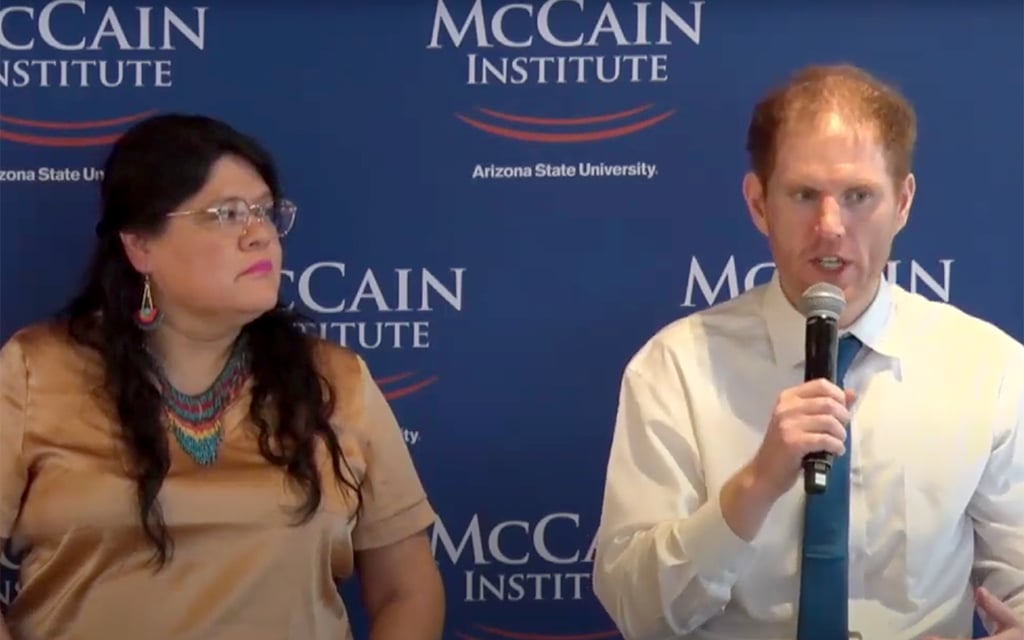
Fair Share America, a tax activism group, rallies outside the U.S. Capitol in Washington, D.C., on Sept. 18, 2024, to advocate for tax changes as some Tax Cuts and Jobs Act provisions are set to expire in 2025. (Photo by Grace Monos/Cronkite News)
WASHINGTON – Arizona’s higher-income residents and homeowners with steep property taxes have felt a pinch since Congress capped the state and local tax (SALT) deduction at $10,000, but the presidential election could lead to changes in the tax code.
The SALT cap and other provisions in former President Donald Trump’s Tax Cuts and Jobs Act (TCJA) are set to expire next year. Even Trump has said he wants to let the cap expire.
“Repealing the SALT cap would only cut taxes for about 5% of Arizonans, almost all at the very top of the income spectrum,” said Marc Goldwein, senior vice president and senior policy director of the nonpartisan Committee for a Responsible Federal Budget.
“The average Arizonan in the top 1% would enjoy more than $20,000 of tax cuts, while almost no one in the bottom 80% would receive any tax cut at all,” Goldwein said in an email.
A large number of Arizona taxpayers are not affected by the deduction cap due to the 2.5% flat state income tax and Arizona’s comparatively low property taxes.
In 2020 the average state and local taxes paid in Maricopa County is $1,433.35, according to the nonpartisan Tax Foundation.
“SALT deduction in Arizona is most valuable in Maricopa County,” said Andrey Yushkov, a senior policy analyst at the Tax Foundation, in an email. “On average, Maricopa County residents would lose $3,082 from the expiration of the TCJA (3.3% of their pre-tax income) while only gaining $355 from the SALT cap repeal.”
Yushkov said wealthier individuals and counties would face the largest overall tax increases if TCJA expires in 2025.
“When there’s a limitation on SALT – and that’s one of the places where you can actually lower your taxable income – that kind of sucks,” said Bridget Grimes, president of Wealth Choice, a financial planning firm for women with an office in Phoenix.
The TCJA that Trump signed in late 2017 was the most significant tax reform in decades.
The TCJA reduced individual income tax rates across all brackets, lowering the top rate from 39.6% to 37%. If it expires, the tax rates and bracket thresholds would revert to pre-TCJA levels, leading to higher tax liabilities for many taxpayers. The decision to extend or expire will ultimately be made by Congress and the next president.
Regardless of the presidential candidates’ proposals, it will be challenging to pass legislation if Congress and the president are on opposing sides.
“It’s hard to envision today a political environment in which it would be addressed,” said Dennis Hoffman, director for the Center for Competitiveness and Prosperity Research at Arizona State University.
The TCJA nearly doubled the standard deduction while eliminating personal exemptions. When this expires, many taxpayers may find themselves itemizing again to use the full deductions. Others might see their itemized deductions fall short of the higher standard deduction under the TCJA.
In addition, the TCJA increased the Child Tax Credit from $1,000 to $2,000 per qualifying child. If this provision expires in 2025, the credit would return to $1,000.
Trump wants to extend most provisions – though he’s singled out SALT as one he would allow to expire.
“We can do it so easily,” Trump said of letting the SALT cap expire at his campaign rally in Long Island, New York, last month. “Wages will soar, the cost of living will fall, and I will deliver the greatest economy in the history of the world to our country and one of the greatest economies in the history of New York state.” Trump didn’t offer further details.
Senate Majority Leader Chuck Schumer, a New York Democrat, blasted Trump on the Senate floor last month, accusing him of pandering in his flip-flop. Trump, he said, “must be suffering from selective amnesia because he was the one who took away people’s SALT deductions in the first place.”
Schumer said Trump’s tax bill is “a dagger aimed at blue states that want to spend a little more to help people with housing, health care and education, transportation.”
Vice President Kamala Harris has opposed tax hikes for those earning under $400,000, which suggests she might support extending some TCJA provisions.
Despite being the former attorney general from California – where state and local taxes are notably high – Harris has not specifically addressed the SALT cap.
Democrats argue the 2017 law disproportionately benefits the wealthy, with households in the top 1% projected to receive an average tax cut of over $60,000 in 2025, while the bottom 60% would see an average cut of less than $500, according to the nonpartisan Center of Budget and Policy Priorities.
The TCJA was a law co-sponsored entirely by Republicans, including U.S. Rep. David Schweikert, who represents Arizona’s CD1. The law was marketed as a way to simplify the tax code and stimulate economic growth.
“Because the standard deduction has been higher, if folks do not have a good amount of itemized deductions, it has simplified taxes,” said Wealth Choice’s Grimes.
Though the increase in the standard deduction did help many taxpayers by eliminating the need to itemize, the overall impact on simplification is debatable.
Changes to the corporate tax code and the introduction of new international tax rules added complexity to certain aspects of the tax system.
According to the Committee for a Responsible Federal Budget, extending all individual tax and estate tax provisions of the
TCJA without any changes would increase deficits by $3.9 trillion through 2035. If the SALT cap is allowed to expire while the other provisions are extended, the deficit impact would be significantly higher, reaching $5.1 trillion over the same period, the think tank said.
The SALT cap largely affects more liberal states like California, New York and New Jersey because of their high income and property taxes.
In addition to cutting the SALT deduction, Trump wants to eliminate taxes on tips, Social Security and overtime wages. Many question how his plans will be funded.
“You ask him how he’s gonna pay for it, and he says through tariffs. Tariffs is a tax on the U.S. consumer,” Hoffman said. “So I guess we’re going to pay for it.”
Harris wants higher taxes aimed at businesses and high earners.
“We’re going to have to make sure that the biggest corporations and billionaires pay their fair share,” Harris said in an interview with MSNBC.







